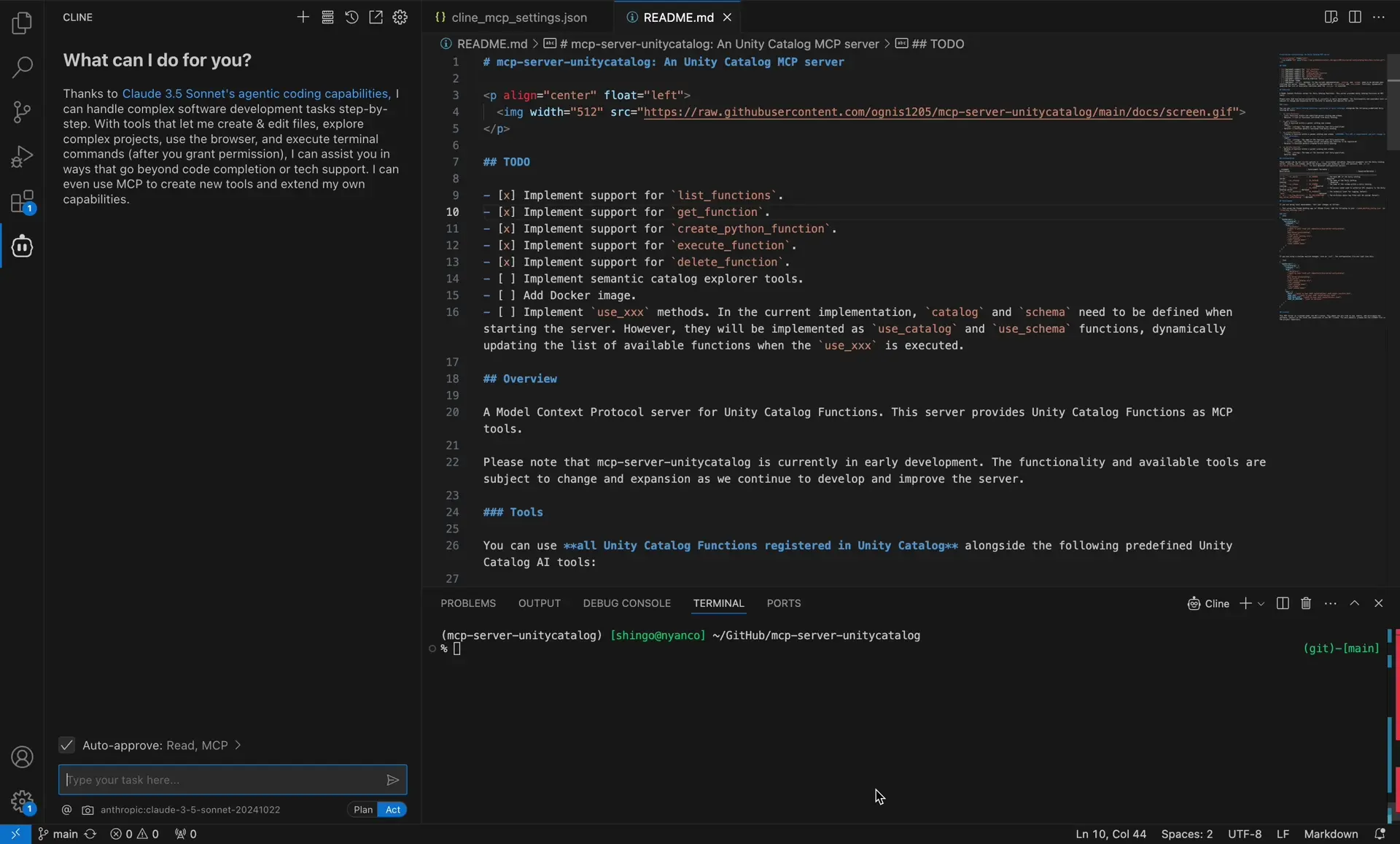About
A Model Context Protocol server that exposes all Unity Catalog functions as MCP tools, enabling seamless integration of Unity Catalog capabilities into LLM workflows. It provides predefined AI tools for listing, retrieving, creating, and deleting catalog functions.
Capabilities

The Unity Catalog MCP server bridges the gap between an AI assistant and the powerful data governance capabilities of Unity Catalog. By exposing all registered catalog functions as MCP tools, it allows developers to query, create, and delete data‑processing functions directly from their conversational AI workflows. This eliminates the need to manually invoke REST APIs or write boilerplate code, enabling rapid iteration on data pipelines and analytics logic.
At its core, the server provides a set of predefined tools—, , , and . Each tool maps cleanly to a Unity Catalog operation, returning structured JSON that the assistant can interpret and present back to the user. For example, gives a concise inventory of available functions within a chosen catalog and schema, while allows the assistant to register new Python scripts on the fly. The design keeps the interface intuitive: function names are short, inputs are simple strings, and outputs are self‑documenting.
Developers benefit from a single point of entry for all Unity Catalog interactions. In practice, this means AI‑powered data engineers can ask the assistant to “list all functions in marketing.schema” or “create a new aggregation function for sales data,” and the assistant will handle authentication, request construction, and error handling behind the scenes. The server’s configuration options (server URL, catalog name, schema, and optional token) are exposed as environment variables or CLI flags, making it easy to integrate into CI/CD pipelines or local development environments.
Real‑world scenarios abound. A data science team can use the assistant to prototype new UDFs, instantly test them in a sandbox catalog, and then promote them to production—all without leaving their IDE. A compliance officer might ask the assistant to audit function definitions across multiple catalogs, receiving a quick summary of ownership and usage. Because the server respects Unity Catalog’s access controls, any operation performed through the assistant automatically inherits the same security posture as manual API calls.
Unique to this MCP server is its seamless integration with popular AI tools like Claude Desktop and VSCode’s CLI. By configuring a single MCP server entry in the assistant’s settings, developers unlock instant access to catalog metadata and function management within their existing workflow. This tight coupling reduces context switching, speeds up debugging, and ensures that the assistant remains a true extension of the developer’s toolkit rather than an external service.
Related Servers
MindsDB MCP Server
Unified AI-driven data query across all sources
Homebrew Legacy Server
Legacy Homebrew repository split into core formulae and package manager
Daytona
Secure, elastic sandbox infrastructure for AI code execution
SafeLine WAF Server
Secure your web apps with a self‑hosted reverse‑proxy firewall
mediar-ai/screenpipe
MCP Server: mediar-ai/screenpipe
Skyvern
MCP Server: Skyvern
Weekly Views
Server Health
Information
Explore More Servers
Claude Crew MCP Server
Autonomous coding agents powered by Claude Desktop and MCP
Mcpsshclient MCP Server
Secure SSH client with AI-driven command filtering
Playwright MCP Server
Model Context Protocol server for Playwright automation
Webpage Screenshot MCP Server
Capture web pages in a snap with Puppeteer
Mapbox MCP Server
Geospatial intelligence for AI applications
Metal Price MCP Server
Instant gold and precious metal prices in any currency